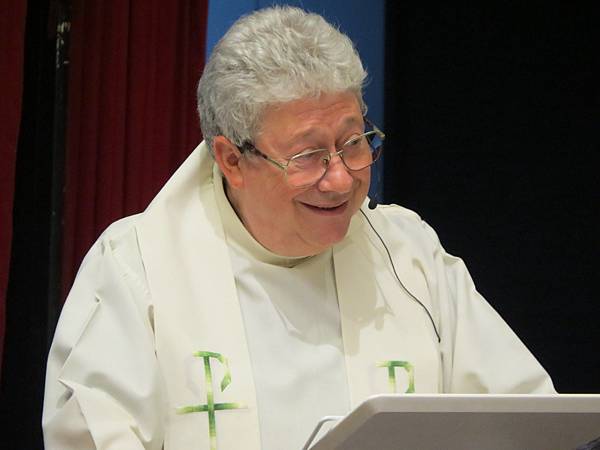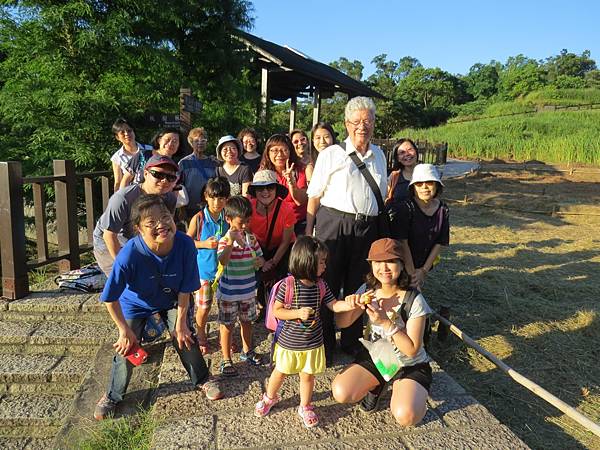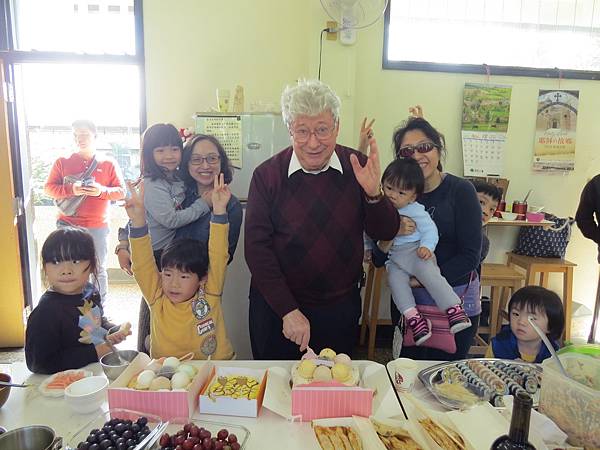We Lived One Hundred Steps from the Church
Jesús María Muñoz, S.J.

I grew up in a very religious family, rosary at home every night, a family with sufficient means to go on… and nothing more. I had an aunt in the city we lived, a member of a religious congregation, whom we visited almost every Sunday (except during Advent and Lent). The sweets she gave us (to me and to the brother and sister who followed) helped a lot with the perseverance of our visits. Furthermore, we spent the summers with my uncle priest, with whom I learned to serve the Mass, Latin answers included, when I was six at most. To stay with him was a help for our economy. On the other hand, my mother helped with the house chores, cooking, mending clothes and the like since my uncle lived with his father, mother and elder aunt, and they could only provide “ordinary daily needs” (the rest waited “for summer”)
Moreover, in our city we lived one hundred steps from the Parish Church. I started my studies with some Sisters who were using the premises of the parish for some kind of school. I learned to read, to write, grammar, arithmetic, geometry, geography, history, some natural sciences and a lot of “Holy history” as we called it. The stories of the Old and New Testament were quite familiar to me (including names like Teglatfalasar III). I had a real good memory. No wonder I won the first price in the “Catechism test” of the Diocese. I was also somehow “fervent”. I liked to go to Mass with my mother in early morning (it was most painful for her to call me, she said). No wonder I never thought of any other profession but priesthood.
So, in the last day of September 1954 I slept for the first time alone. I was ten years old. I spent three years there, in Alcalá de Henares. I will limit myself to one anecdote. There were preparations for some leaflet for the “Day of the Seminary”. In an interview, they asked me, a barely twelve years old, what I liked more about being a priest and I answered without any hesitation: “the consecration (of the Mass) and the preaching”. A vision, a program.
Then they sent me to a kind of national seminary annexed to the “Pontificia Universidad de Comillas”. It was for diocesan seminarians, but run by the Jesuits, as the University was. The atmosphere there was quite different. Seriousness in studies, personal responsibility and real personal spiritual life. In the last three years, called Rhetoric, the Sodality of our Lady played an important role, mainly through the “sections”. I belonged to one in which we cultivated the desire to exercise our ministry in poverty in favour of the working class. I was eager to do pastoral activity in one of the suburbs of Madrid, my diocese. I prayed earnestly every day and offered myself for that. Besides, the study of Spanish Literature, with the poems of St. John of the Cross, led easily to a really felt intimacy with Jesus. It is the nearest I got to mysticism.
That was the opening God needed. On my last year the day before Mission Sunday, at the end of breakfast very suddenly, an idea crossed my mind: “why do you not go to Japan as a missionary?” Being a fervent seminarian, before going to class, I went to the Chapel and told Jesus the bizarre idea I just had. “Why bizarre?” He asked, and I, sure of myself, answered the obvious: “we diocesans, do not go there, to Japan go the Jesuits!”, “Then, join the Jesuits” came back. I had barely the time to whisper: “Nonsense”, I made a genuflexion, and left. That was not the end. For seven months I struggled with Him, defending the front line… until it fell, and I had to retreat to the next line of defense. I noticed one thing: when I was more inclined to give up and accept, I was a better person, in studies, relations and spiritual life. “Interesting”, I thought. Finally, on the feast of the “wound of St. Ignatius”, I gave up fighting and started the proceedings for surrender. First, I had to tell the Spiritual Father, but I could not do it just with words. I took a piece of paper, drew horizontal and vertical lines at the centre and wrote on top: pros and cons, for both propositions. (Later on, when I made the first “long retreat” I found that these were two of the ways that St. Ignatius proposes for a good discernment. I had been a Jesuit AVANT LA LETTRE). Nevertheless, as I was a rather timid person, I arrived three times at the door of the Spiritual Father, but did not have the courage to knock. The third day, when retiring, I noticed a picture in the corridor, in front of his office: the vision of Paul at Troas where a Macedonian (European) was asking Paul (an Asiatic) to come and help them: the reverse of the situation I was dealing with. (To this day, every year, when I have to explain that section in class, I cannot avoid some emotion). Enough, I returned… and knocked.
In September 1961, I arrived at Salamanca to start the noviciate on the second day of October. That was辛丑年 but I did not know yet! There I found news about the Jesuits returning from China and those in the Far East Province. The most remarkable thing in the noviciate was my “second long retreat”. Our master of novices encouraged “participation” on the part of those in the second year. I ended up “participating” 26 days. They were kind of “exercises in daily life” since I had also to help with service of the table, cleaning the tableware, and attend classes! I found a point for discernment. I had sensed that the Province still had links with the Far East Province, but none with Japan. I was afraid that if I insisted to go to Japan I might never get there, but perhaps for the “Far East”… they would be more willing. For me, both were very distant in any respect. Therefore, I made a discernment and decided to ask for “Far East Province”, to great delight of my Master of novices, who had gone to China with Fr. Rábago (later he returned because of illness). I never regretted it in the last 59 years.
After the vows, a problem came up. I was too young to start Philosophy, not yet 20. I had gone throughout all the classical studies that were the bulwark of the studies at that stage. So, they decided that I take a course to “perfect” the classical studies: a full year into the works of ancient Greek authors. A perfect preparation to come to China! No irony, it was! In the sense of obedience. I repeated every day and more than once a phrase in the then standing “Rules for the Jesuit Students”: “…and even if they never arrive to use what they study, let them be aware that they cannot do anything more pleasant to God… than dedicate themselves to study with the aforementioned spirit…” (Translation from Latin by the author.)
Philosophy was a completely different story. The studies were very far from life and really never interested me. Contestation was surging in every corner. The political situation in the country became rather volatile. The Vatican Council was going on and making changes. Television and Newspapers were entering the community space… My spiritual life was decreasing in intensity more than I liked to admit even to myself.
A year of teaching in a school before coming here did little to help. I was unbelievably busy. The spiritual life was reduced most of the days to the Mass and a visit to Blessed Sacrament in the evening. I was glad to repay the Province, before leaving, for all they had spent on me. With no small relief, I received in May a letter from Fr. Socius of the Far Eastern Province telling me that Taiwan was the part of the Province I was assigned to. Also were instructions on how to proceed.

On September 10, 1968 I landed at SongShan International Airport and three days later arrived at HsinChu Railway Station. Then I had to confront a double, simultaneous “cultural shock”. On the one hand, the normal cultural shock of the European coming to an Asiatic, Chinese, culture. And in the community, the unexpected confrontation with a Western cultural environment very different from what I had experienced until that moment. How did I fare with the first shock is up to the Chinese people to say. I think it was not so bad since they have tolerated me for almost 50 years. The second shock accompanied (or should I say haunted?) me until the end of the study of Theology. Perhaps also an influential fact was that I did not succeed in learning the Chinese language to the point I had expected.
The atmosphere was not the most conducive for a recovery of the spiritual life. In fact, most of the foreign young Jesuits I came across during those years eventually left the Society. Yet, there was a timid growth and it was strengthened during and through the study of Theology.
The internal tension started to lose intensity during the second year of theology. New developments appeared. First, the proposition from the part of Fr. Socius to go for studies on the Bible in order to serve in the Faculty. I liked the idea and thanked God for “that peculiar year of Greek”. Yet some misunderstandings made a miserable summer for me. Finally, at the beginning of the third year, everything was resolved and I could adapt to the situation with some peace.
This peace of spirit was also reflected in a renewed interest in my fundamental priestly vocation. And a better spiritual life. Another fact came to strengthen it all. In the winter of the third year, I went to a camp for some Catholic Association with a name hitherto unknown to me: Christian Life Community. There I found that it was the development of the good old Sodality! I was thrilled, literally: I found a rather large group of young Christians interested in faith and spiritual life. I can say that for the first time I knew or I sensed why I came and why I was here. Material conditions were rather severe: cold, just sufficient nourishment and little time to sleep. However, as I told a Father who came to visit us: “very consoled in the Lord”. In one word, I became fully reconciled with my stay here and confirmed in the mission.

But, nothing lasts long. Immediately after the camp, I went for the retreat to prepare for ordination. Everything was going smoothly until the last day. Then I started to think that it all was false from the beginning, that in reality I had no vocation but a fear of the “outside world”, fear that I could not cope with the exigencies of “real life”, that I could not be able to go through, like so many ex-companions who left, and I was covering it with the fictional mantel of “religion”; all was the result of religious overprotection. In one word, that I had no faith. It was not easy to admit all that, but I succeeded and decided to act. I was ready to ask to leave, as soon as I got home, and see how I can fare. Then at the last moment, just before leaving the retreat house in Changhua, I went to the Chapel. I told Jesus that I was quitting because I had no faith. Back came a little question: “Then, what are you doing kneeling here?” All disappeared as if “someone had taken a heavy coat from my shoulders”. I needed that purification. I felt solidified.
The two experiences: consolation and purification came when I was 30, and in China: 三十而立.
Then came ordination in June and the first pastoral experiences with CLC and Sunday Masses in Churches. Then the studies in Rome and return, to consolidate all in the “third probation” and last vows. The rest until today is a natural development with those same lines of activity: Holy Scripture, pastoral work with CLC (and “Spiritual Exercises in daily life”) and serving in a couple of parishes for Sunday Mass.
Sixty years, sometimes controverted but always fully alive.
Laus Deo Virginique Matri


 留言列表
留言列表
